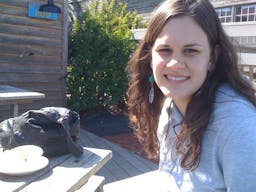Realizing what I do not know: reflections on Kenya and life
Apr 28, 2022
Story
On my first days in Kenya, our program staff told us to lower our expectations.” Initially, we, students studying abroad, did really know what this meant. We were too caught up the euphoria of a new place; the stimulation provided by even the most mundane things such a boarding a matatu or buying ndizi in the local market..
But, as I spent more time in Kenya, I began to ponder this question. I remember sitting the first two to three weeks at my field placement, in a village called Orongo, wishing I had something concrete to do. Something that would prove me useful to the organization. The CBO I was placed with, a widows and orphans group, always had work to do, but time is fluid, more circular in Kenya. Almost every task takes longer than expected, yet people find time just to exist, without hurry. I knew this, even enjoyed the break from the timebound culture of the US, and still I found myself impatient. When it took awhile for me to find a routine in the organization, I began to think that “lower your expectations” meant that I had to lower expectations of those around me.
Yet, when I tried to assist in the nursery school, I did not get far because I didn’t speak the area language, dholuo. When I worked with my supervisor in a HIV/AIDS training in a local school, where the language of instruction was English, my accent was too thick, my anecdotes irrelevant in the local context. I attended a community health seminar, thinking I would be at least somewhat knowledgeable on the material. Again, I was wrong. I didn’t know which local foods had which vitamins. Compared to most of the women in attendance, who had children, I knew nothing about childbirth or breast feeding. My host mother’s knowledge of traditional medicines went right over my head. Thus, I began to realize that “lower your expectations” meant lowering expectations of myself, not of those around me. I also reevaluated my time that I thought had been wasted, and found that I had learned so much through observation, conversation and new relationships.
I recently graduated from college, but my experience in Kenya is living proof that my degree, a symbol of the knowledge that Western society values, is only one type of knowledge. It is not universal, is not relevant in very situation. There is so much to learn beyond books and academia, knowledge that can only be attained through experience, or many of them. This is stating the obvious, but according to a quote from a book I read on crossing cultures, “there is all the difference in the world between believing academically, with the intellect, and believing personally, with the whole living self” (Aldeous Huxley, Jesting Pilate). I am now back in Kenya, working on a research grant, and I am again reminded that I have much to learn beyond the academic work that brought me here.




